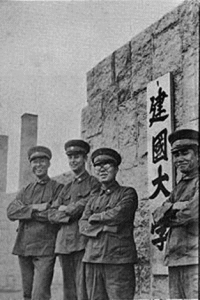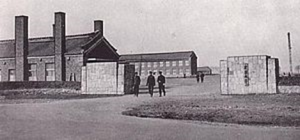中秋の思い出! 幻?のスーパーエリート大学と燃える一万円札


「秋の落日」を見ると思い出すのは、親族が以前学んだ中国、満州の大学です。
ある日、親族が話したこの大学は 日本やアジアの若きエリートを集めて開学した
「満州建国大学」です。
この大学は1938年~1945年(わずか7年)当時、満州国の首都・新京
(現在の中華人民共和国吉林省長春市)に関東軍が開学した官僚養成学校、
言わば「ミニ東大」。
大学のテーマは 「五族協和」でした。
そこで、学んだ学生は 中国人、ロシア人、朝鮮人、モンゴル人?等各国から集まった
およそ1500人。
この大学は当時、日本としては非常に珍しい、初めての国際交流大学でした。
その特長は、当時の学界の名物教授?たちが思想や信条に関係なく、
広く日本国内外から集められていたという事です。
このため、教室での講義は常に熱気に満ちあふれていて、古典的な話ばかりする講師
に対し、学生たちが「個人の話ではなく、祖国、日本は今後どうあるべきかを聞きたい」と
詰め寄る場面も見られたという事です
そして、学生は出身民族に関係なく、約15人が一つの「塾」と呼ばれる寮で生活した
そうです。塾では「立って半畳、寝て一畳」のコトワザの通り、1人1畳のスペースが
与えられたそうです。
開学のテーマ「五族協和」の実践を目指し、同じ民族の学生同士が隣り合わないように
配置されるほどの徹底ぶりだったそうです。
そして、毎晩、異民族がそれぞれの立場で独自の意見を交換する熱い「座談会」が開かれ、
片言の日本語か英語での討論だった様です。
このスタイルは現在のアメリカの大学の授業スタイル「ディベート」と同じで、
単に相手の話を聞くのではなく、自分の意見、各地の実情などの説明がメイン。
こうして、在学中は文字通り異民族の学生同士の本音・裸の付き合いとなった様です。
また、異民族でトラブルが続出しそうな状況にも関わらず、不思議な事に塾生活には
一切の規則がなく、指導教官も学生の相談には応じるものの、全く自由で、塾生同士の
自主性・試行錯誤に任せていたという事です。
そして、具体的な授業と言えば、午前中は教室で基本的な講義を受け、
午後は柔剣道などの武道のほか、畑作業などの農事実習さらに馬術や軍事訓練などに汗を流したとの事。
親族は 学生時代の思い出を振り返りながら、世界平和への行程や軍事力に頼らない異民族の
共存共栄の理念を熱く、静かに語りました。
私は、初めての経験、話なのでそんな世界があったのかと熱心に聞いていました。
また、途中で同じ大学で学ぶ学生についても話始め、「とかくメダカは群れたがる!」
「弱い犬ほど吠えたがる!」と過去の経験談を語りました。
そして、「本当に精神的強い人は逆境に強く、常に冷静さを保つなあ!」と。
親族は この大学で学んだ事や多様性を実体験した事を誇りに思っていました。
しかし、戦後の日本の復興に関しては、アメリカの民主主義は認めたものの、
極端な資本主義、拝金主義については否定的でした。
昭和40年代半ばの当時の日本は戦後の高度成長期を続けていて、個人的には
夜の宴会が増え、着るものも少し綺麗でオシャレになり、田舎の生活も徐々に
良くなってきた感じもしていました。
しかし、親族は話の最後に いきなり、財布から1万円札を取り出して、「こんな紙幣・
紙くずが人間を堕落させるんだ」と言ってライターで火をつけて燃やし始めました。
(これは本当の話です)
私はあっけにとられて、その行為を眺めていましたが、間もなく当時珍しい1万円札
(今の価値では、約10万円位でしょうか?)が燃えて灰になり、秋風に吹かれて
パラパラと飛んでいきました。
私は、それを眺めて 「理想はそうかもしれないけど、やはりお金は大事だよ~」と心でささやきました。
Memories of Mid-Autumn! Phantom? A Super Elite University and a Burning 10,000 Yen Bill
The falling autumn sun reminds me of a university in Manchuria, China,
where my relative once studied.
One day, my relative told me that this university was the “Manchurian National University,”
which was established to attract young elites from Japan and Asia.
“Manchuria University.
This university was a bureaucratic training school, a “mini-Tokyo University,” so to speak,
opened by the Kwantung Army in Xinjing, the capital of Manchuria (present-day Changchun
City,
Jilin Province, People’s Republic of China) from 1938 to 1945 (only7 years).
The theme of the university was “Harmony of the Five Families.
The students who studied there were Chinese, Russians, Koreans, Mongolians? and other countries.
About 1,500 people.
This university was the first international exchange university, which was very rare in Japan
at that time.
One of the features of this university was that it was the first international university in Japan.
They came from all over Japan and abroad, regardless of their ideologies and beliefs.
For this reason, lectures in the classrooms were always full of enthusiasm, and there were
times when students would approach the assistant professors who only talked about the
classics, saying, “We want to hear about what Japan, our homeland, should be like in the
future, not about individuals.
The students, regardless of their ethnic origin, lived in a dormitory called “juku.
The students, regardless of ethnicity, lived in a dormitory called “Juku. In the dormitory,
each student was given a space of one tatami mat, as the saying goes, “Standing is half a
tatami mat, sleeping is one tatami mat.
In order to put into practice the theme of the opening of the school, “Harmony of the Five
Families,” students of the same ethnicity were not allowed to live next to each other.
Every night, a heated “round-table discussion” was held where students of different ethnicities
exchanged their own opinions from their respective standpoints, and the discussions were
conducted in only a few words of Japanese or English.
This style of debate is the same as the current American university style of teaching.
Rather than simply listening to the other side, the main focus was on explaining one’s own
opinions and the actual situation in each region.
In this way, the students of different ethnicities were able to get to know each other honestly
and nakedly.
In addition, despite the fact that the students were from different ethnic backgrounds,
there were no rules and regulations in the school life.
Despite the fact that the students were from different ethnic backgrounds, and
there seemed to be a lot of trouble, strangely enough, there were no rules at all in the life of
the school, and the instructors, although they consulted with the students, were completely
free and left the students to their own initiative and trial and error.
In the mornings, students attended basic lectures in the classroom, and in the afternoons,
they took part in martial arts such as Jukendo, agricultural practices such as working
in the fields, horse training, and military training.
The relatives looked back on their memories of their time as students and spoke passionately
and quietly about their journey to world peace and the idea of coexistence and co-prosperity
among different ethnic groups without relying on military power.
I listened intently, wondering if such a world existed, as it was my first experience and story.
He also began to talk about the students studying at the same university, saying,
“Killifish tend to flock together!
”The weaker the dog, the more he barks!
He went on to say that mentally strong people are strong in adversity and always keep their
cool. He said it.
My relatives were proud of what they had learned at the university and the diversity
they had experienced.
However, when it came to the post-war reconstruction of Japan, they acknowledged
the democracy of the United States, but rejected the extreme capitalism and money-grubbing.
At that time in the mid-1960s, Japan was continuing its post-war period of rapid growth,
and I personally
There were more parties in the evenings, people were becoming a little more beautiful and
fashionable in what they wore, and I also felt that life in the countryside was gradually
getting better.
However, at the end of the conversation, my relative suddenly took out a 10,000yen bill from
his wallet and said, “These bills, these scraps of paper, are what corrupt human beings.
He said, “These bills and scraps of paper corrupt people,” and started to burn it with a lighter.
(This is a true story.)
I was taken aback and watched the act, but soon I found a rare 10,000yen bill
Soon, a rare 10,000yen bill (about 100,000 yen in today’s value?) Soon after,
a rare 10,000yen bill (about 100,000 yen in value today?) was burned to ashes
and flew away in the autumn breeze.
I looked at it and whispered to myself, “Ideally, it may be so,
but money is still important.”
I whispered in my heart.
